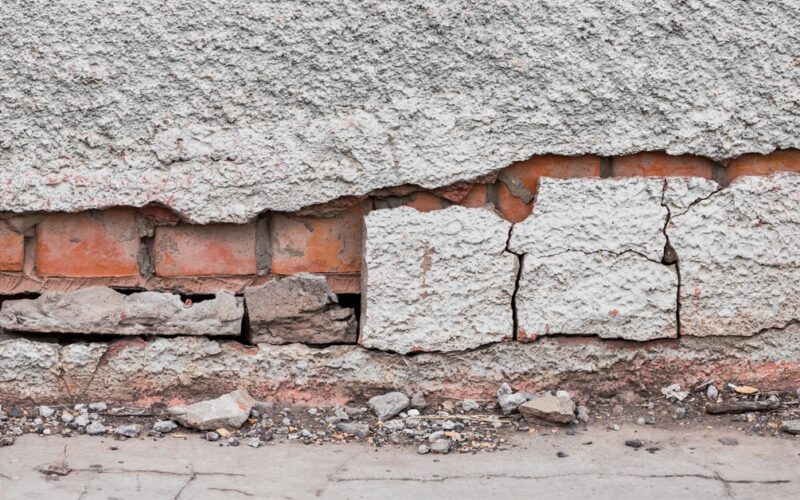For most homeowners, the phrase “foundation difficulties” conjures up images of expensive repairs. Even so, you might be surprised to hear that some foundation inspections and repairs are less costly than you might think. Many issues are superficial in nature, but others are structural in nature. You’re probably wondering what a home foundation inspection entails and who you should employ if you need one. Fortunately, there are qualified structural engineers who can evaluate your foundation and determine the amount of damage, as well as recommend viable solutions. Continue reading to find out more about the structural engineer foundation inspection and the cost of hiring one.
What is a Foundation?
You might be wondering what a foundation is before we get started. A foundation is the lowest load-bearing portion of a building, often built below the earth.
There are three components that are required for effective performance at the most basic level:
- The ability to withstand the weight of the structure above
- Resistance to groundwater
- The ability to act as a water and soil vapor barrier
These three essential conditions must be met regardless of the type of foundation you have.
The following are some examples of common foundation types:
- Slab foundation.
- Crawl Space Foundation
- The basement foundation
Who Does a Foundation Inspection?
Hairline cracks, growing cracks, and bowing walls can be seen by anybody walking around their home. It’s one thing to see them; it’s another to understand what’s causing the issue and how to fix it. A structural or foundation engineer can help with this. These experts are educated in the physics and mechanics of how a foundation can fail and how to best restore it. Repair may not be possible in very extreme circumstances. But don’t worry—the purpose of a home foundation inspector is to help homeowners understand their specific situation, safety concerns, and potential solutions. You can trust that the inspectors’ report is based on their expert assessment of your foundation because they don’t perform the repairs themselves.
What Can I Expect From A Home Foundation Inspection?
During a home foundation inspection, an inspector will look around the interior and outside of your home for evidence of structural deterioration. They’ll also inspect the land on which your house is built for any symptoms of ground shifting or water drainage difficulties.
Home Foundation Inspections: A Guide for Do-It-Yourselfers
With this quick introduction to DIY foundation inspections, you’ll be able to recognize the signals that your home needs a professional inspection.
#1. Take a walk around the outside of your home.
Begin by going outside. Go to a secluded area of the home. Examine the external walls of your home. Look for locations on your walls that bulge in particular. Bulging can signal that the foundation is under an unbalanced load. The foundation walls should be level and not sag.
Large fractures in your concrete are another thing to look for when evaluating the exterior of your home. The earth around your home shifts as a result of standing water. It also puts the slab in danger of shifting unevenly.
But how can you determine if you have a major foundation crack? The foundation of your home is not harmed by cracks that are smaller than 14 inches wide. Keep an eye out for cracks that are larger than 14 inches. This could be a sign of a foundation issue.
Apply waterproof paint over the crack to determine the severity of the crack. Check to see if the paint splits or chips over time. If this occurs, it could mean the foundation is shifting or the fracture is widening, necessitating a professional home foundation inspection.
#2. Floors with a Slant
It can be tough to detect things like sloping flooring as a homeowner.
You can get a good idea of how to level your foundation by performing a quick ball test. Place a ball on the floor and start playing. If it slides across the room, your foundation is probably slanted and has to be inspected. If it doesn’t roll, you’re probably out of trouble.
#3. Gluing Windows and Doors
Your windows and doors are often early indicators of a problem before your walls or floors show symptoms of a problem. Nothing is more inconvenient than a door that won’t close or a window that won’t open. Furthermore, these seemingly innocuous annoyances are frequently indicators of a significant foundation problem.
Your doors should glide open and shut with ease. If they become stuck, foundation repairs may be required. Another clue that you may have foundational slope concerns that require inspection is if your windows stick and warp.
#4. Foundation Cracks
Cracking is one of the most evident signals that your home needs a foundation inspection. When your walls and ceiling crack, your foundation is most likely shifting.
However, how do you know whether a crack is major or minor? This is a problem when you have cracks in your sheetrock or brick. Some cracks, on the other hand, are prevalent and aren’t necessarily a reason for alarm. It’s time to be concerned if you find fissures that are 1/8″ or larger. A few tiny cracks, on the other hand, aren’t going to be the end of the world.
Read Also: CRAWL SPACE FOUNDATION: Types, Cost, and How To Build It
What Is a Structural Engineer Foundation Inspection?
A licensed structural engineer (credentials are “PE”) does a foundation inspection to confirm that the foundation’s structural integrity is intact.
This type of inspection will give you vital information regarding the foundation, such as:
- If the structure is suitable for habitation
- When do the existing cracks pose a threat to structural integrity, and if so, what should be done about them?
- Is your foundation is being affected by the freeze-thaw cycle, and if so, how to prevent further damage
- If your foundation has changed, what effect will it have on the rest of the structure? (i.e. water in the basement, uneven floors, or safety issues)
This information can give you peace of mind that your foundation is sound, encourage potential buyers in a home sale transaction to proceed with their purchase, provide useful documentation for tracking any future structural movement, and help you get building permits for future remodels and additions.
Finally, knowing that your home is structurally robust and capable of withstanding the passage of time is comforting.
Related: SIGNS OF MOLE IN YARD AND HOW TO GET RID OF THEM
Reasons Why You Should Hire a Structural Engineer to Evaluate Your Foundation
You may have a variety of worries regarding your structure, causing you to seek a foundation inspection from a structural engineer.
#1. A home inspector requested a structural engineer’s review of the foundation to guarantee structural integrity.
A general home inspector may at times advise a customer to seek a structural engineer’s opinion. This would often be for larger-than-eighth-inch fissures in poured concrete walls/block foundations, severe movement/bowing, or unusual foundation designs like wood foundations. This is due to structural engineers’ particular knowledge of foundation design and their ability to give structurally sound remedies in the event of complex challenges.
#2. A demand imposed by a mortgage lender (or another party):
The lifespan of a building might be jeopardized by an unsafe or underperforming foundation. By obtaining a structural engineer’s certification, a mortgage lender might gain “insurance” or confidence that they are spending wisely on the project. Lenders want to know that a potential home buyer has the financial means to remedy any problems that arise as well as the ability to pay the mortgage. Borrowers may be required to remedy faults by some lenders.
#3. You’re looking to buy a home as an investment or to flip:
It is always a good idea to check the structure’s bones before investing in a new house. If you discover later that the foundation is failing, you may find yourself spending money on unanticipated repairs.
Sometimes the foundation problems are so severe that destruction is the most cost-effective solution. Talk about a drastic change of plans! In comparison, spending less than $1,000.00 on a foundation inspection upfront appears to be fairly reasonable.
If, on the other hand, demolition was always your intention, then a shoddy foundation won’t matter.
#4. You note that an existing crack has widened or that there has been fresh shifting:
Most cracks under 14 inches in diameter are physically sound. However, if repairs are required, it is still a good idea to have the cracks checked by a specialist.
The freeze-thaw cycle may influence your home depending on where you reside. When water infiltrates a crack and freezes under freezing temperatures, the expansion and contraction of ice and water can cause the fissures to expand over time. If this cycle is hurting your home, a specialist can advise you on how to break it before more serious problems arise.
A structural engineer can also assist in determining the source of any foundation wall movement or shifting. Many of the problems are caused by the use of improper soils. Clay-based soils, for example, will retain moisture in the ground. Because of hydrostatic pressure, moisture around your foundation can cause a slew of issues.
Hydrostatic pressure is the inward and downward pressure placed on your basement/foundation walls as a result of water pushing against it.
Not only is there water pressing against the walls, but if temps dip low enough, the water near your foundation will freeze and expand, placing even more pressure on the walls.
You may notice cracking, shifting, or bowing as the ice solidifies. This can lead to major problems over time.
#5. You just want to know that your foundation is solid.
Home or building owners will occasionally engage a structural engineer to assess the current state of their foundation to ensure that their investment is properly cared for. Preventative maintenance is far more efficient than waiting for issues to emerge, as smart building owners understand. Furthermore, maintenance records are useful to have on hand if a building owner decides to sell the property.
#6. Requirements of the building department for a remodel/addition or other work
In some cases, a structural engineer foundation inspection is required in order to obtain a building permit. If you plan to add a second storey to your home or install a green garden above your garage, you’ll want to make sure the foundation can support the additional weight. Discuss the criteria for your building project with your contractor and city building inspectors.
What Does a Foundation Inspection by a Structural Engineer Entail?
Although each structural engineering firm’s method is different, most will follow the same basic steps:
#1. An inspection of the foundation.
The structural engineers will examine the foundation/basement walls for evidence of structural movements such as ceiling/wall cracks, sloped/uneven flooring inside the home, and dampness, mildew, or general water within the basement.
The perimeter of the home will be evaluated for cracks, brick veneer concerns, fascia board conditions, and other difficulties with poured, block, and slab foundations.
If your home or structure has a pier/beam foundation, the engineer would most likely enter the crawl space and take notes on the internal temperature, such as whether it is wet or musty. Building components including piers, joists, and beams will also be inspected.
If cracks or shifting are discovered, displacement measurements will be taken. Any/all discoveries will be photographed.
#2. A visual inspection of the surrounding environment
Improper water management can often lead to foundation problems. The foundation inspection by a structural engineer should take into account the grading surrounding the foundation as well as the presence or absence of a roof water management system.
They may also take into account the types of soils around the foundation, as well as neighboring shrubs and huge tree roots.
All of these elements can have an impact on the state of your foundation, and if not properly handled, can result in cracks, structural concerns, and basement water.
#3. Communication on the job
Throughout the inspection, the engineer will discuss his or her findings with you and answer any concerns you may have. If you have any specific issues, make sure to express them to the engineer while he is on the job.
#4. An engineer’s stamped report of results
This report may include findings, pictures, diagnoses, recommendations, and, if necessary, the scope of repair. A report like this will usually suffice to meet your mortgage lender’s, building department’s, contractor’s, or personal demands.
However, make sure to discuss the cause for your inspection with your engineer, as well as any specific criteria you may require in the report. This will aid the structural engineer in comprehending your expectations and customizing the report to meet your requirements.
How Much Does a Foundation Inspection by a Structural Engineer Cost?
The cost of a structural engineering foundation inspection is determined by the project’s size and complexity.
Factors that may influence your fees to include:
- The number of square feet
- The complexity of the project
- The expertise of the professional
- The location of the structure
- Foundation access
You should anticipate paying between $400 and 750 for a modest residential home.
Larger, more complicated projects can cost anything from $1,000 to $3,000.00.
These fees may appear exorbitant at first look, but keep in mind the value that an inspection and report provide.
It could save you thousands of dollars in unanticipated repairs if you acquire a home with hidden faults, or it could give you a maintenance regimen to prevent significant issues from arising.
A structural engineer report has also been utilized by potential homebuyers to negotiate a cheaper price for the home they wish to buy!
What Is the Best Way to Locate a Residential Structural Engineer to Conduct My Foundation Inspection?
- Ask your home inspector, contractor, building department, or architect for a recommendation. These specialists frequently collaborate with structural engineering firms and may be able to recommend the ideal business for you.
- Check Google: If you type “structural engineer near me” into the search box, you’ll get a list of nearby companies. Take a look at their customer reviews. This will provide you with valuable information regarding their turnaround time, pricing, and overall customer happiness.
- Websites such as Porch.com, Angie’s List, or HomeAdvisor: These sites may give you vendor options, but they frequently need you to enter personal information into their database. They’ve even been known to share your personal information with five to ten different suppliers, resulting in your phone ringing nonstop. We advise against utilizing Home Advisors and instead go direct.
What Is A Foundation Assessment?
A foundation assessment provides vital information about the structure, such as whether or not the building is safe to occupy, whether or not existing cracks or fractures threaten the structural integrity of the building, and whether or not the foundation has shifted and how it affects the rest of the building.
Foundation Inspection FAQs
What do inspectors look for in foundation?
Following the collection of floor elevation data, the inspector must thoroughly evaluate the inside and exterior of the structure for damage, cracks, separations, leaning/listing walls or doors, stuck windows/doors, or any other visible signs of foundation movement.
How much does it cost to check your foundation?
The cost of a foundation inspection ranges from $200 to $400 on average.
How often should foundation be inspected?
Checking your foundation at least twice a year, if not every quarter, is a smart idea. Temperature extremes and harsh weather can create water saturation in the soil around your foundation, as well as melt snow and ice.
How should you inspect a foundation?
Examine the foundation for spots that bulge or lean, as this can suggest an unbalanced load. The foundation walls and the house walls should both be flush and level. Examine the concrete for any signs of water damage or cracks. Standing water can cause soil to shift and wood to rot, causing significant damage.






